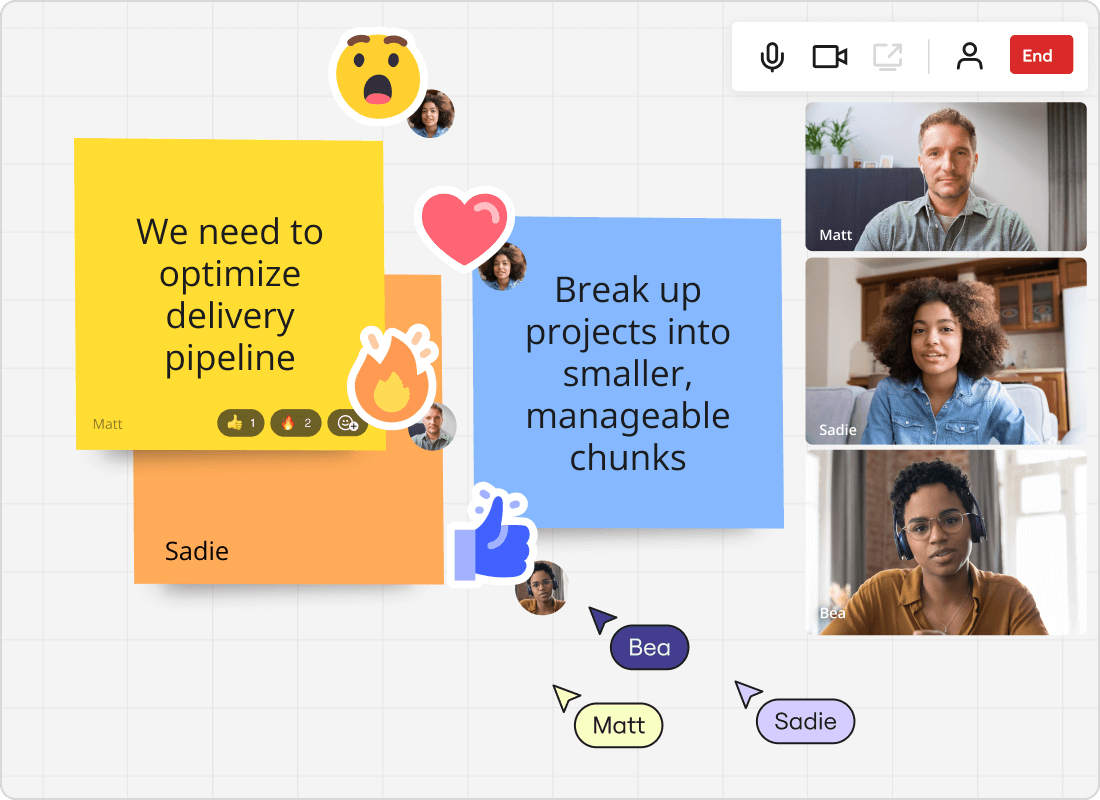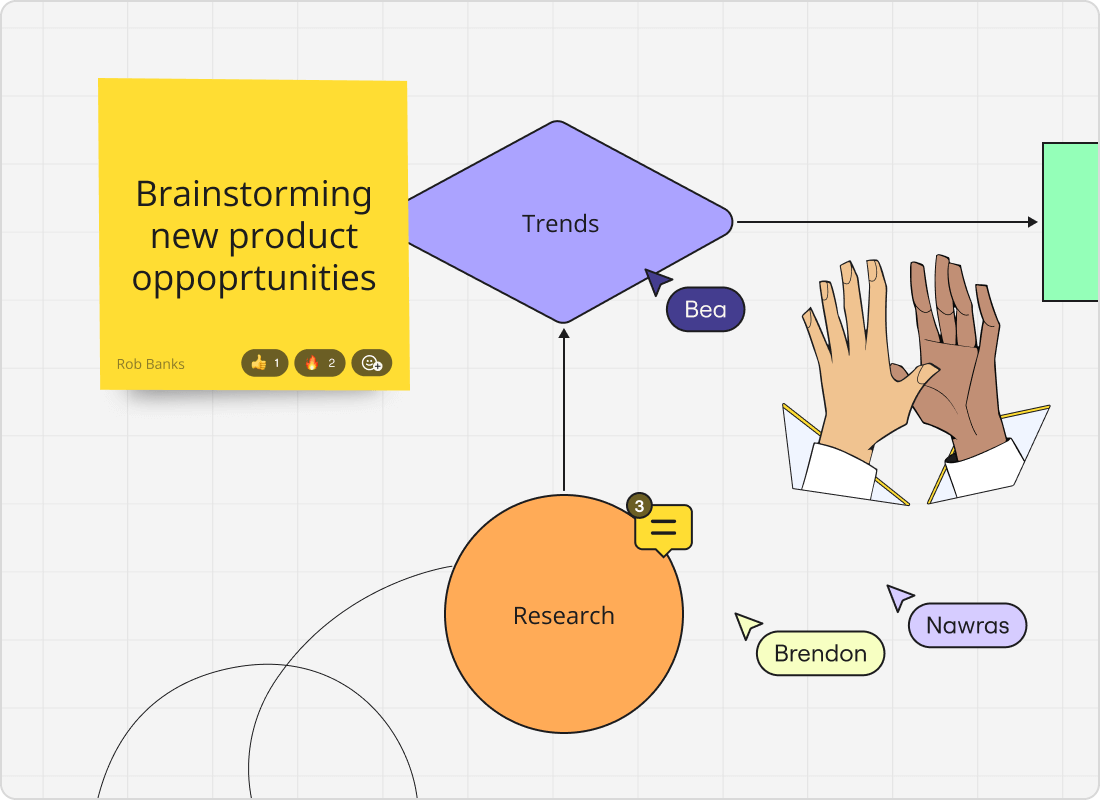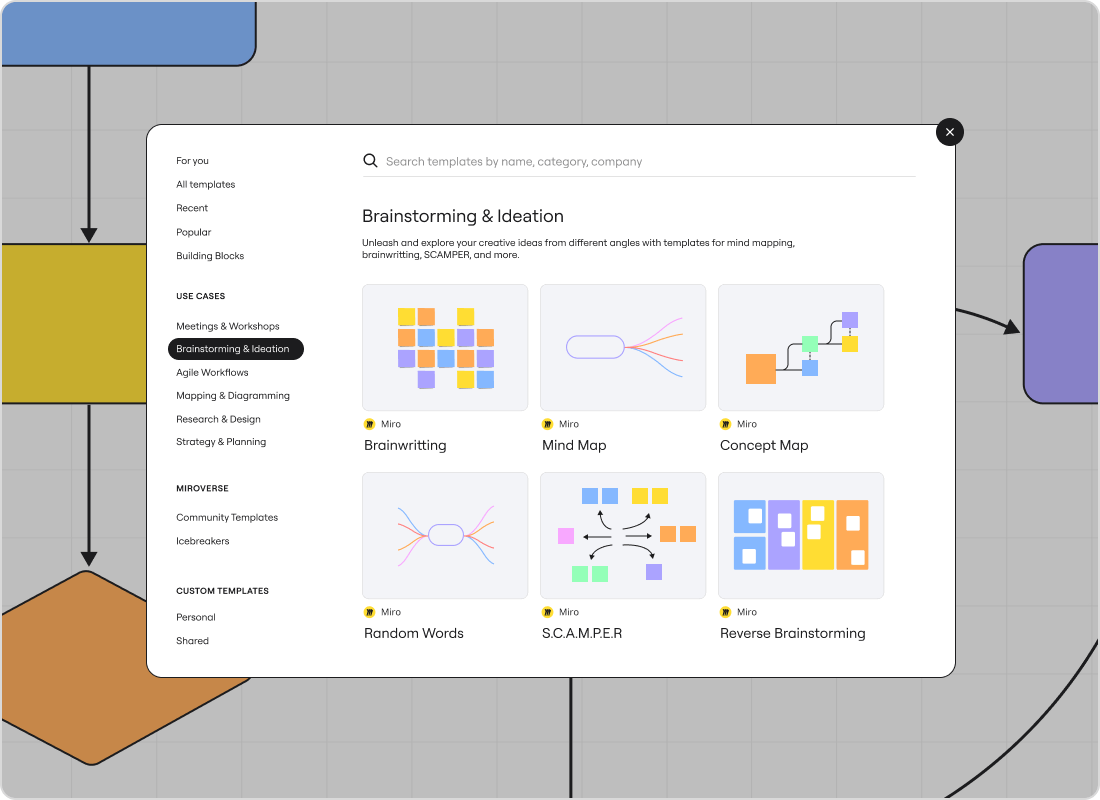งานไฮบริด
ทำงานร่วมกันไม่ว่าคุณจะทำงานที่ไหนหรือเมื่อใด
Skip to:
สร้างอะไรก็ได้ด้วยกันบน Miro ฟรีและใช้งานง่ายเหมือนไวท์บอร์ด แต่ทรงพลังยิ่งกว่าอย่างไม่มีที่สิ้นสุด Miro เป็นแคนวาสที่ไร้ขอบเขต ซึ่งมาพร้อมกับเครื่องมือจำนวนมากที่ได้รับการออกแบบมาเพื่อการระดมสมองและการทำงานร่วมกันอย่างสร้างสรรค์


ผู้ใช้มากกว่า 90 ล้าน คนทั่วโลกไว้วางใจ Miro


ทำงานร่วมกันในรูปแบบใหม่โดยใช้แคนวาสที่ไร้ขอบเขตของเรา แสดงภาพไอเดียและสร้างการเชื่อมโยงเชิงลึกโดยปราศจากข้อจำกัดที่มีอยู่ในเครื่องมือทางกายภาพแบบดั้งเดิม Miro สร้างพื้นที่ที่ใช้ทำงานร่วมกันสำหรับการระดมสมองที่ให้อิสระแก่คุณในการทำงานให้สอดคล้องกับกระบวนการคิดของสมอง และเป็นเครื่องมือที่ช่วยผลักดันไอเดียของคุณไปข้างหน้า

คิดนอกกระดานไวท์บอร์ดดิจิทัล อย่าจำกัดงานที่ยอดเยี่ยมเอาไว้ภายในแค่มิติเดียว แต่จงใช้ประโยชน์จากพื้นที่ทำงานด้านนวัตกรรมอันไร้ขอบเขตของ Miro
พาทุกคนมารวมตัวกัน โดยไม่เกี่ยงว่าพวกเขาจะอยู่สถานที่แห่งไหนหรือเขตเวลาใด ย้ายจากพื้นที่ทางกายภาพไปสู่พื้นที่ดิจิทัลได้อย่างลื่นไหลภายในไม่กี่วินาทีโดยใช้ Interactive Display, Stickies Capture App และแอป iOS และ Android

ส่งเสริมพลังสร้างสรรค์ที่คุณสามารถสัมผัสได้ชัดผ่านความสามารถในการทำงานร่วมกันอันน่าดึงดูดของ Miro หลีกเลี่ยงไม่ให้เกิดการคิดแบบติดกลุ่มด้วยการลงคะแนนแบบไม่เปิดเผยตัวตน อยู่ในกำหนดเวลาด้วยตัวจับเวลา และให้ทุกคนเข้าร่วมและเป็นส่วนหนึ่งของปฏิกิริยาการตอบสนองแบบเรียลไทม์

เร่งความเร็วในการสร้างไอเดีย จัดกลุ่มข้อมูลเชิงลึก และสรุปประเด็นสำคัญด้วยพลังของ AI สร้างแผนผังความคิดที่กรอกข้อมูลไว้ล่วงหน้า ซึ่งนำเสนอมุมมองใหม่ ๆ ช่วยให้คุณสามารถปรับทิศทางความสนใจของทีมไปสู่การจัดลำดับความสำคัญ การปรับแต่ง และการทำตามขั้นตอนถัดไป

Miro มีทุกสิ่งทุกอย่างที่คุณต้องการในการถ่ายทอดไอเดียของคุณออกมาเป็นภาพ จัดทำแผนผังกระบวนการที่ซับซ้อน และการและออกแบบผลิตภัณฑ์ล้ำสมัย ตั้งแต่บันทึกย่อช่วยเตือนและข้อความไปจนถึงภาพวาด แผนภาพ และการรองรับไฟล์ที่หลากหลาย ไม่ว่าจะเป็นไฟล์รูปภาพ, GIF, เอกสาร, ชีต และ PDF

คอลเลกชันเทมเพลตมากมายสำหรับกิจกรรมการคิดเชิงออกแบบ การทำสตอรี่บอร์ด S.C.A.M.P.E.R การระดมสมองผ่านการเขียน และเทคนิคการระดมสมองแบบดั้งเดิมอื่น ๆ อีกมากมาย ชุมชนผู้เชี่ยวชาญของ Miro ช่วยทำให้แน่ใจว่าคุณจะมีเครื่องมือทั้งหมดที่จำเป็นสำหรับการคิดแบบบลูสกาย

“เราใช้ Miro สำหรับเซสชันไวท์บอร์ดในระหว่างการประชุม เพื่อแสดงภาพสถาปัตยกรรมและภูมิทัศน์ที่ซับซ้อน และเพื่อวัตถุประสงค์ในการทำงานร่วมกัน ในระหว่างการประชุมที่ผู้เข้าร่วมบางส่วนหรือทั้งหมดทำงานจากระยะไกล Miro จะทำหน้าที่เป็นสิ่งทดแทนไวท์บอร์ดจริงที่ดีที่สุดเท่าที่ผมเคยเจอ”


Edward Rousseau ผู้จัดการอาวุโสจาก Deloitte
ทำงานร่วมกันไม่ว่าคุณจะทำงานที่ไหนหรือเมื่อใด
ตั้งเป้าหมายและติดตามความคืบหน้าไปสู่เป้าหมายเหล่านั้น
จัดทำแผนผังไอเดีย จัดทำแผนภูมิโครงการ และแสดงตัวอย่างไอเดีย
ดึงดูดและรักษาความสนใจของทุกคนโดยทำให้พวกเขาเข้ามามีส่วนร่วม
มองดูการพังทลายของอุปสรรคอันเนื่องมาจากการทำงานร่วมกันที่ดีขึ้นและเร็วขึ้น
แสดงภาพงาน ความเกี่ยวโยง และผลลัพธ์
แน่นอน! คุณสามารถแบ่งปันไวท์บอร์ดเสมือนจริงกับสมาชิกในทีม เพิ่มพวกเขาเป็นผู้แก้ไข หรือส่งออกงานของคุณเป็น PDF ได้
ไวท์บอร์ดของ Miro เป็นไวท์บอร์ดเสมือนจริงแบบซูมได้ที่ช่วยให้ผู้ใช้สามารถนำเสนอไอเดีย ทำงานร่วมกันทั้งแบบอะซิงโครนัสและแบบเรียลไทม์ได้ นอกจากนี้ยังสามารถใช้งานไวท์บอร์ดเพื่อระดมสมอง อำนวยความสะดวกในการประชุม จัดเวิร์คช็อปและคลาส agile และอื่น ๆ อีกมากมายได้อีกด้วย ไลบรารีเทมเพลตของ Miro มีเทมเพลตมากมายหลายร้อยแบบเพื่อให้เหมาะกับทุกความต้องการ
ใช่ คุณสามารถเข้าถึง Miro Lite ซึ่งเป็นไวท์บอร์ดออนไลน์ฟรีและไวท์บอร์ด Miro เวอร์ชันเรียบง่ายได้ ไม่จำเป็นต้องสมัครใช้งานและไม่มีค่าใช้จ่ายใด ๆ ทั้งสิ้น แต่หากคุณต้องการเข้าถึงคุณลักษณะเพิ่มเติม ให้สร้างบัญชี Miro เพื่อเริ่มต้น
ประสานการทำงานร่วมกับทีมของคุณภายในไม่กี่นาที



















